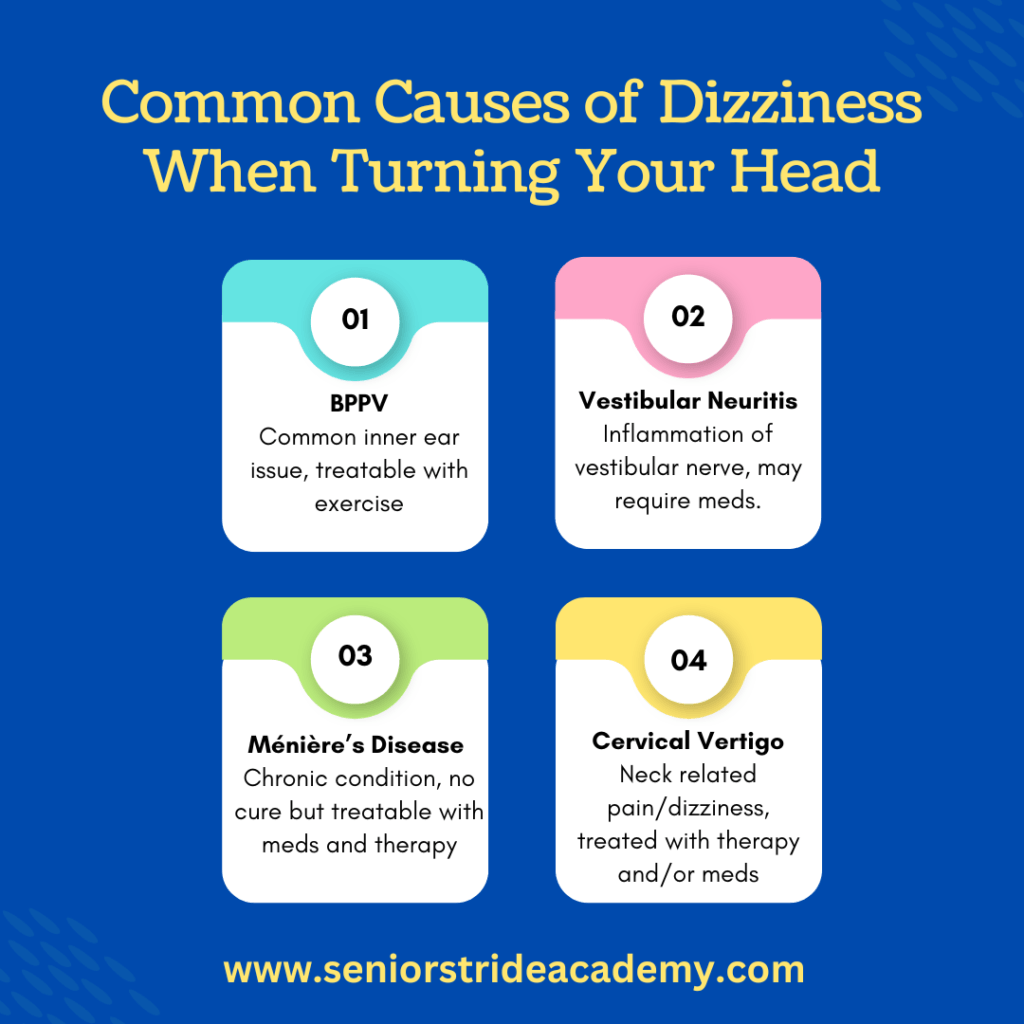Feeling dizzy when turning your head can be a disorienting and uncomfortable experience, but it can also increase your fall risk if it happens while walking.
This is especially true for seniors.
This disorienting sensation can range from a brief moment of lightheadedness to a more intense, spinning feeling that can make it difficult to go about your daily activities.
Whether it happens when you quickly look over your shoulder, tilt your head back, or even turn over in bed, this type of dizziness can catch you off guard and leave you feeling vulnerable.
For seniors, these episodes are particularly concerning because they can increase the risk of falls, leading to serious injuries.
The good news though, is that this type of dizziness is often treatable.
But in order to manage it, it’s helpful to know and understand what’s causing it in the first place – and that’s where I can help.
In this article, we’ll discuss the most common causes of this type of dizziness, discuss potential treatments, and offer practical tips to help you stay steady and confident in your movements.
Defining “Dizziness“
Dizziness can be hard to describe.
I work with patients experiencing dizziness all the time and I hear all kinds of varying descriptions.
Some seniors might describe it as feeling “woozy” – I’ve also had folks tell me their head feels “fuzzy” with certain movements.
The most common descriptions though, include feelings of lightheadedness and feeling off balance.
Dizziness is a generalized term for all these subjective feelings, but vertigo is its own animal.
Vertigo describes the specific sensation of spinning (or moving) and it often comes with feelings of nausea.
It’s a good idea to try and determine whether you’re feeling generalized dizziness or vertigo when describing your sensations because determining between the two can help pin-point the cause.
Dizziness can come from a lot of different sources, but true vertigo is usually coming from an inner ear issue.
Common Causes of Dizziness With Head Turning
Dizziness with turning your head is often associated with issues in the inner ear, the neck, or the nervous system.
The sensation can range from mild unsteadiness to severe vertigo, where it feels like the room is spinning.
This type of dizziness can occur when you quickly move your head, look up, or even turn over in bed. It may be brief or last for several minutes, depending on the underlying cause.
Several conditions could be causing this issue, but here are the most common:
1. Benign Paroxysmal Positional Vertigo (BPPV)
BPPV is the most common cause of dizziness when turning your head.
It occurs when tiny calcium crystals, known as otoconia, dislodge from their normal location in the inner ear and move into one of the ear’s semicircular canals. These crystals disrupt the fluid movement in the ear that helps you maintain balance, leading to brief but intense episodes of vertigo.
BPPV is most common in folks over the age of 60, but can really affect people at any age.
This condition is annoying, but it can often be cured with physical therapy treatment (just know that if you have BPPV once, you’ll likely have it again in the future).
Symptoms: A sudden spinning sensation that lasts for a few seconds to a minute, usually triggered by head movements such as looking up, turning your head, or rolling over in bed. Seniors will often feel dizziness when getting in or out of bed as well.
Treatment: Certain head movements (like the Epley maneuver), can be used to get the otoconia back where they belong and eliminate symptoms. You can try these at home if you feel comfortable, or see a physical therapist or ENT for specialized treatment.
2. Vestibular Neuritis
Vestibular neuritis is an inflammation of the vestibular nerve, which connects the inner ear to the brain and helps control balance.
This condition is usually caused by a viral infection and can lead to dizziness, especially when moving your head.
Vestibular neuritis can last a long time, with vertigo/dizziness being worse in the early phase and milder for an extended period afterwards.
But most cases are resolved in a few weeks.
Symptoms: Sudden onset of vertigo that can last for several hours or days, along with nausea, vomiting, and imbalance. Head movements may exacerbate symptoms.
Treatment: Vestibular neuritis often improves on its own over time, but medications to reduce dizziness and nausea, as well as vestibular rehabilitation exercises, can help speed recovery. Your doctor may also put you on some antiviral meds as well.

3. Ménière’s Disease
Ménière’s disease is a chronic inner ear condition that can cause episodes of vertigo, along with hearing loss, tinnitus (ringing in the ears), and a feeling of fullness in the ear.
The vertigo associated with Ménière’s can be triggered by head movements, leading to dizziness when turning your head.
But you can experience generalized dizziness without moving your head as well.
Researchers aren’t exactly sure what causes this disease and unfortunately, there’s no cure to date.
There are roughly 45,000 new diagnoses of Ménière’s each year in the US and most of these cases occur in folks between 40 – 60 years old.
Symptoms: Sudden, severe vertigo that can last for several minutes to hours, fluctuating hearing loss, tinnitus, and ear pressure.
Treatment: Managing Meniere’s disease often involves dietary changes (such as reducing salt intake), medications to control symptoms, and in some cases, surgical procedures. Your doctor may also prescribe physical therapy to help with balance issues and fall reduction.
4. Cervical Vertigo
Cervical vertigo (cervicogenic dizziness) is a type of dizziness that occurs due to problems in the neck, aka the cervical spine.
There’s a little controversy over whether cervical vertigo is a real condition because there’s really no diagnostic testing available to prove that your dizziness is coming from an issue in your neck.
It’s usually a diagnosis of exclusion, meaning every other source of your dizziness (inner ear, blood pressure, etc) has been ruled out.
This condition is often associated with cervical spondylosis (age-related wear and tear of the spinal discs) or other injuries causing neck pain.
Cervical vertigo is often described as a more generalized sensation of dizziness, although you may experience true vertigo as well.
If your dizziness is accompanied by neck pain, you could be experiencing this condition.
Symptoms: Dizziness, neck pain, stiffness, and a feeling of imbalance, especially when turning your head or maintaining certain neck positions.
Treatment: Physical therapy, neck exercises, and posture correction can help alleviate symptoms. In some cases, medications or cervical spine treatments may be necessary.
Preventing and Managing Dizziness When Turning Your Head
If you experience dizziness when turning your head, there are several strategies you can use to reduce the frequency and severity of episodes:
- Move Slowly: Avoid sudden or rapid head movements, especially when getting up from bed, looking up, or turning around.
- Stay Hydrated: Dehydration can worsen dizziness, so be sure to drink plenty of fluids throughout the day.
- Exercise Regularly: Regular physical activity, particularly exercises that improve balance and strengthen the neck muscles, can help reduce dizziness.
- Maintain Good Posture: Proper posture, especially when sitting or standing, can reduce strain on your neck and improve blood flow, helping to prevent dizziness.
- Limit Caffeine and Alcohol: Both caffeine and alcohol can exacerbate dizziness, particularly in people prone to vertigo or anxiety.
When to Seek Medical Attention
When in doubt, see your healthcare provider.
Although mild dizziness when turning your head is often manageable, it’s especially important to seek medical attention if:
- The dizziness is severe or accompanied by symptoms such as double vision or fainting.
- You experience dizziness along with chest pain, shortness of breath, or severe headache.
- The dizziness persists or worsens over time, affecting your daily activities or quality of life.
- You have a history of heart disease, stroke, or other serious health conditions.
- Your dizziness has lead to falls or is affecting your ability to get around your house
Final Thoughts
Dizziness and vertigo in any form are no fun.
These symptoms can hit you at any time, but they’re more common with head movements, making them a potent risk for falls while walking.
Dizziness with head turning can be a troubling symptom, but understanding its possible causes and how to manage it can help you maintain your balance and safety.
And luckily, most of these causes are treatable and shouldn’t have long term effects.
If you’re experiencing this type of dizziness frequently or it’s interfering with your daily life, don’t hesitate to consult a healthcare provider.
Anyway, I hope you found this helpful. If you have any questions or would like to comment on your own experience with dizziness, please leave ’em below and I’ll get right back to you.



